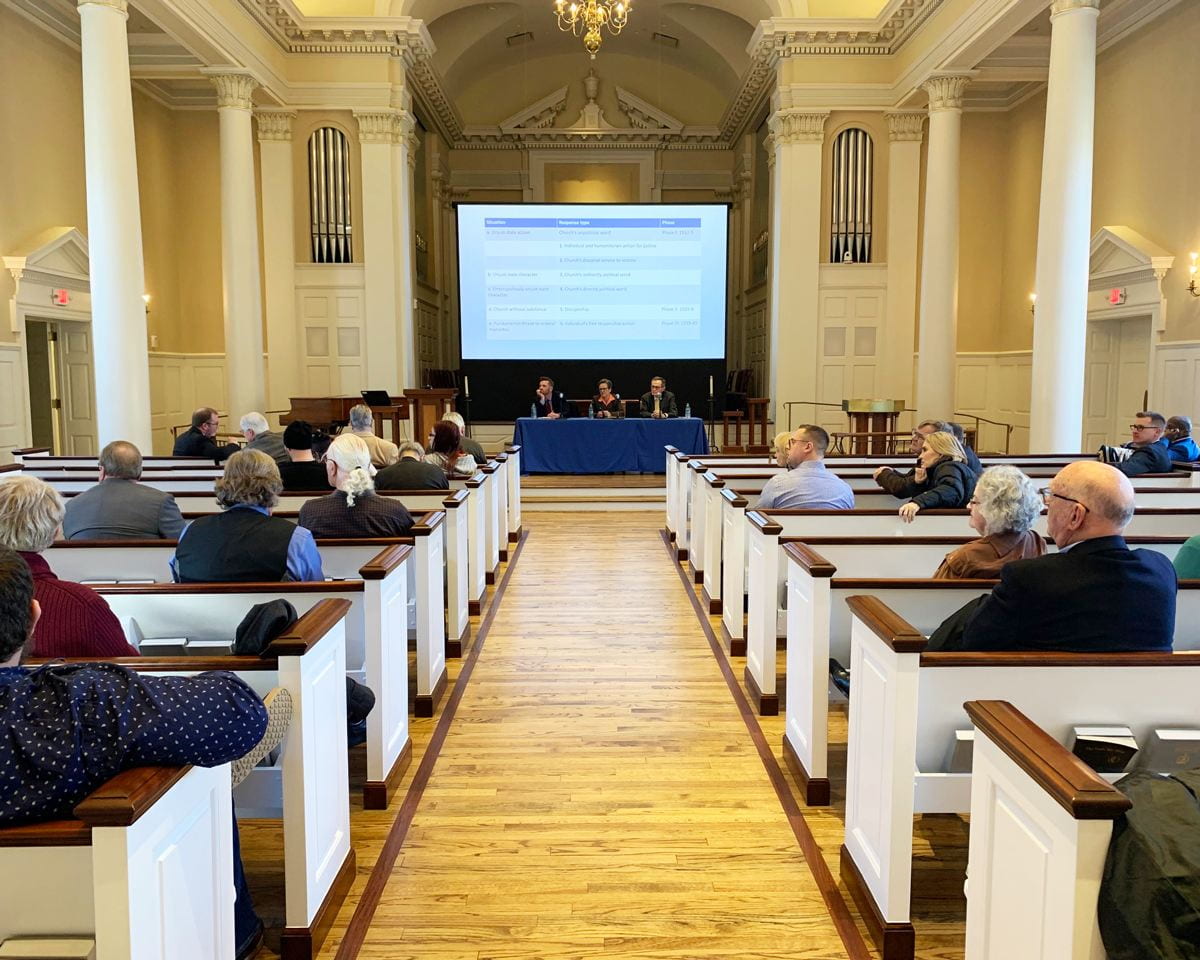Dietrich Bonhoeffer lived in extraordinary times – the darkest days of Nazi Germany. Most of us, however, spend our lives in largely ordinary circumstances.
But ordinary life may be the realm in which Bonhoeffer has the most to teach us, according to speakers at a short conference at Perkins and SMU. Titled “In the Face of Barbarism: Dietrich Bonhoeffer on Culture, Humanity and the Importance of the Ordinary Life,” the conference took place February 13-14.
Most scholarly and popular portrayals of Bonhoeffer focus on the exceptional circumstances of his life in Nazi Germany; this conference focused instead on the importance of everyday life in Bonhoeffer’s theology and ethics.
The conference kicked off with a keynote by Victoria Barnett, a well-known scholar of Bonhoeffer, the Confessing Church in Nazi Germany and the history of religious groups during the Holocaust. She talked about the influence of his childhood and life with family and friends.
“Bonhoeffer’s family believed that every book, every friend, every discipline undertaken, shapes our character,” Barnett said. “When we neglect habits, they fall into disrepair. When we tolerate cruelty, we are diminished.”
Opening the second day of the conference, Natalie Carnes presented “Why Waste? Defending Art in a World of Poverty,” with responses from Natalia Marandiuc, assistant professor of Christian theology, and Dallas Gingles, associate director of the Houston-Galveston extension program and conference organizer.
Carnes, associate professor of theology at Baylor University, contrasted the story of Matthew 25, in which Jesus talks of feeding the hungry and clothing the naked, and says, “Whatever you did for one of the least of these … you did for me,” and Matthew 26, where Jesus defends the woman who anointed him with expensive oil. Carnes noted that in 2019 $1 billion was raised within two days after fire nearly destroyed Notre Dame Cathedral in Paris, raising questions about whether that kind of spending is justifiable when so many children go hungry every day.
“This tension has reverberated throughout Christian history, between spending money on big lavish buildings versus projects to help the poor,” she said.
Yet art was a prominent part of Bonhoeffer’s life, as reflected in his writings. John LaNoue, an attendee at the conference, said the Carnes presentation brought back memories of a church trip he led to Bonhoeffer’s spartan living quarters in Berlin, where he lived just before his arrest and execution.
“His room was very sparse – just some books, a desk, a lamp, a bed,” he said. “But there was also art. He had an alpine landscape and a detail of Albrecht Dürer’s The Four Apostles on the wall. In prison, he made a cross with some string. Art was important to him.”
The third speaker, Michael DeJonge, spoke on “Before Resistance: Bonhoeffer and the Cultivation of Ordinary Life,” with former Perkins dean Robin Lovin and Rebekah Miles, Perkins professor of ethics and practical theology, responding.
DeJonge, professor of religious studies at the University of South Florida, recounted a news media reference to Bonhoeffer. After a critic referred to what he characterized as Donald Trump’s “fascist tendencies,” the interviewer took issue.
“If you really believed he was a fascist dictator, you’d take up arms and fight him,” the anchor retorted, citing Bonhoeffer’s participation in a plot to assassinate Hitler.
That’s the wrong way to read Bonhoeffer’s writings, DeJonge said.
“I want to resist the association between Bonhoeffer and violent overthrow,” he said. “His example does not teach us to take up arms at the first whiff of tyranny. That truncates his witness and hides the multitude of ways that his political thought and action were in service of ordinary life.
“There have been so many attempts along both ends of the political spectrum to apply Bonhoeffer’s situation directly to their side of the political argument,” said David Krause, an attendee and board member of the International Bonhoeffer Society’s English language section.
“That isn’t fair to Bonhoeffer. I always ask the question, ‘How can we use the life and teachings of Dietrich Bonhoeffer to inform our own faithfulness to Jesus Christ?’ The answer is Christocentric, not political.”
“Bonhoeffer was a passionate defender of what we might call everyday ethics,” Gingles said. “It’s a shame that he’s appropriated almost exclusively in the service of extreme choices within exceptional circumstances.” Gingles added that this is a perspective he’s offering his students – and requiring them to wrestle with – as part of the course he is teaching at Perkins this semester on Dietrich Bonhoeffer.
Continuing the emphasis on art, the program concluded with “A View from the Underside: The Legacy of Dietrich Bonhoeffer,” a one-person play performed by Al Staggs and presented in conjunction with the Meadows School of the Arts.
Gingles estimates that about half of the 65 or so people in attendance, like LaNoue and Krause, came from outside of Perkins. Helping boost attendance was his op-ed column published in The Dallas Morning News on February 9.
When the op-ed ran, four of LaNoue’s friends sent him text alerts, all within 20 minutes. A pediatric surgeon and a self-described “Bonhoeffer nut,” LaNoue immediately signed up and attended the conference. It was a fortunate coincidence, given that he was on vacation that week and was preparing to lead an intensive on “Dietrich Bonhoeffer: His Life and Formation,” at his church, Valley Ranch Baptist in Coppell, on March 1.
“I really enjoyed getting to meet people who share that interest in Bonhoeffer,” he said. “We had a fascinating conversation around the lunch table.”
